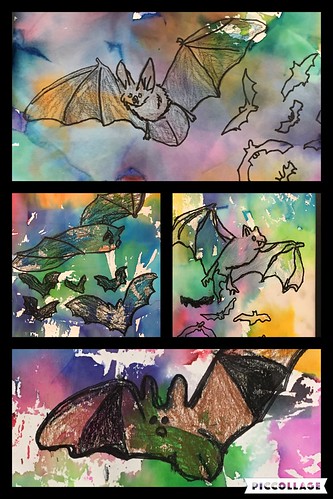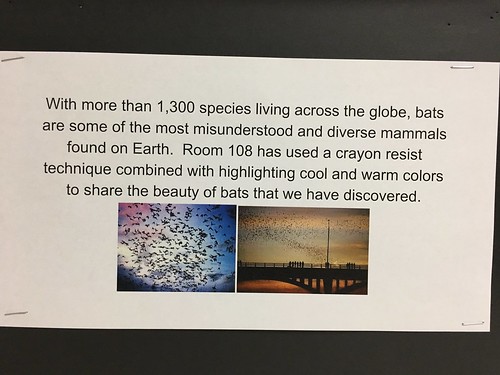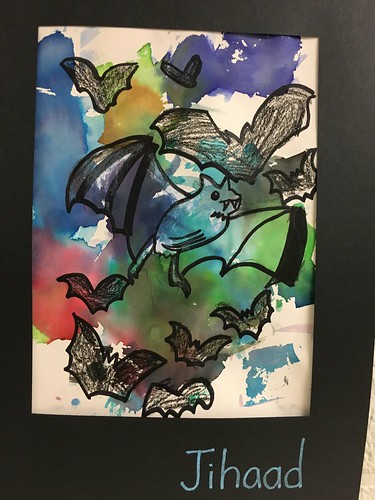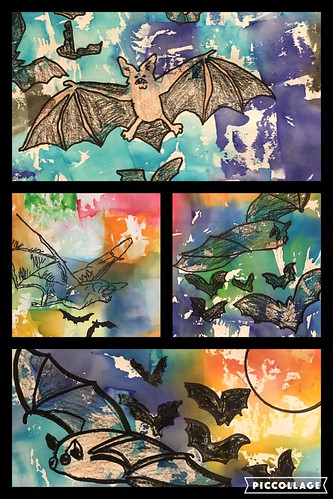Did you know there are over 1300 different species of bats, but only 3 of those are vampire bats? Also, vampire bats don’t attack humans, they usually prefer cows. These are just a few of the things my third and fourth graders have been learning this month about bats!
This week (Oct 24-31, 2016) is National Bat Week! Lots of free resources and lesson ideas are available on www.batweek.org. (@Bat_Week) The last two weeks Room 108 students at Positive Tomorrows have been studying and learning about bats, and this week we’ve already participated in two live webinars about bats. We’ve also created some “Crayon Resist Art” about bats, which turned out really well and I’ll describe in more detail in this post.
Yesterday we participated in the free virtual field trip “Bat Zone Encounter” offered by Field Trip Zoom (@fieldtripzoom). Some of their virtual field trips are free, and others require that you pay a $50 annual membership fee. (We might do this after yesterday’s positive experience.) Many of the questions my students had were answered by the biologists in the webinar.
Today we watched the first “Amazing Bats” live webinar offered by Bat Week, which is also archived online. It’s just 15 minutes long. 3 additional webinars are offered this week on Wednesday, Thursday and Friday, and if you can’t tune in live (it’s at noon for us in US Central Time) you can watch the recorded archives on YouTube.
Last year my students learned to create “crayon resist art” for a project we did on Oklahoma state symbols. This is the lesson description I created, following the format we use as an Oklahoma A+ School (@okaplus).
For the project, students first drew bats of their choice on their paper. They used crayons as well as black markers for their bat drawings. Then students placed a special kind of tissue paper, which “bleeds” color onto the page when you put some water on it, onto their art pages. We added small amounts of water on top of the tissue paper, and let the artwork dry. In this student project, notice how he used the “cool colors of the night” which surround bats most of the time as nocturnal mammals. He also used some brighter colors to show the setting sun.
When students use wax-based crayons (regular crayons) to draw on their art pages, those places “resist” the tissue paper bleeding ink. After the water and ink is completely dry, students used a black sharpie pen to retrace over areas of their drawing they wanted darker. Students used traceable outlines of different kinds of bats to make their drawings, so most of them are scientifically correct for different bat species.
Here is a collage of several student crayon resist art bat week projects. I’ve shared all my students’ bat artwork in this Flickr album.
I’ve also started a Twitter list composed of organizations and individuals focused on bat education and conservation. I also found this Twitter list of UK-based bat conservation and education organizations. I’ve followed both of these in Flipboard (@flipboard) on my iPhone and iPad, which makes this bat-related information stream into a digital magazine. I have created several “magazines” in Flipboard where I flip (or save) interesting articles I want to use for lessons or to share with others.
One of the things the scientists in Monday’s virtual field trip challenged us to do is share our learning about bats with others! My students are working now on a paper slide video about bats, which we’ll be sharing on our classroom YouTube channel soon. Look for it coming later this week. You can follow me on Twitter (@sfryer) for more updates about our Bat Week learning! Also follow the Twitter hashtag #BatWeek for more bat facts, lesson activities, and related videos you can share with students!




